Chemical Testing in Kovvur
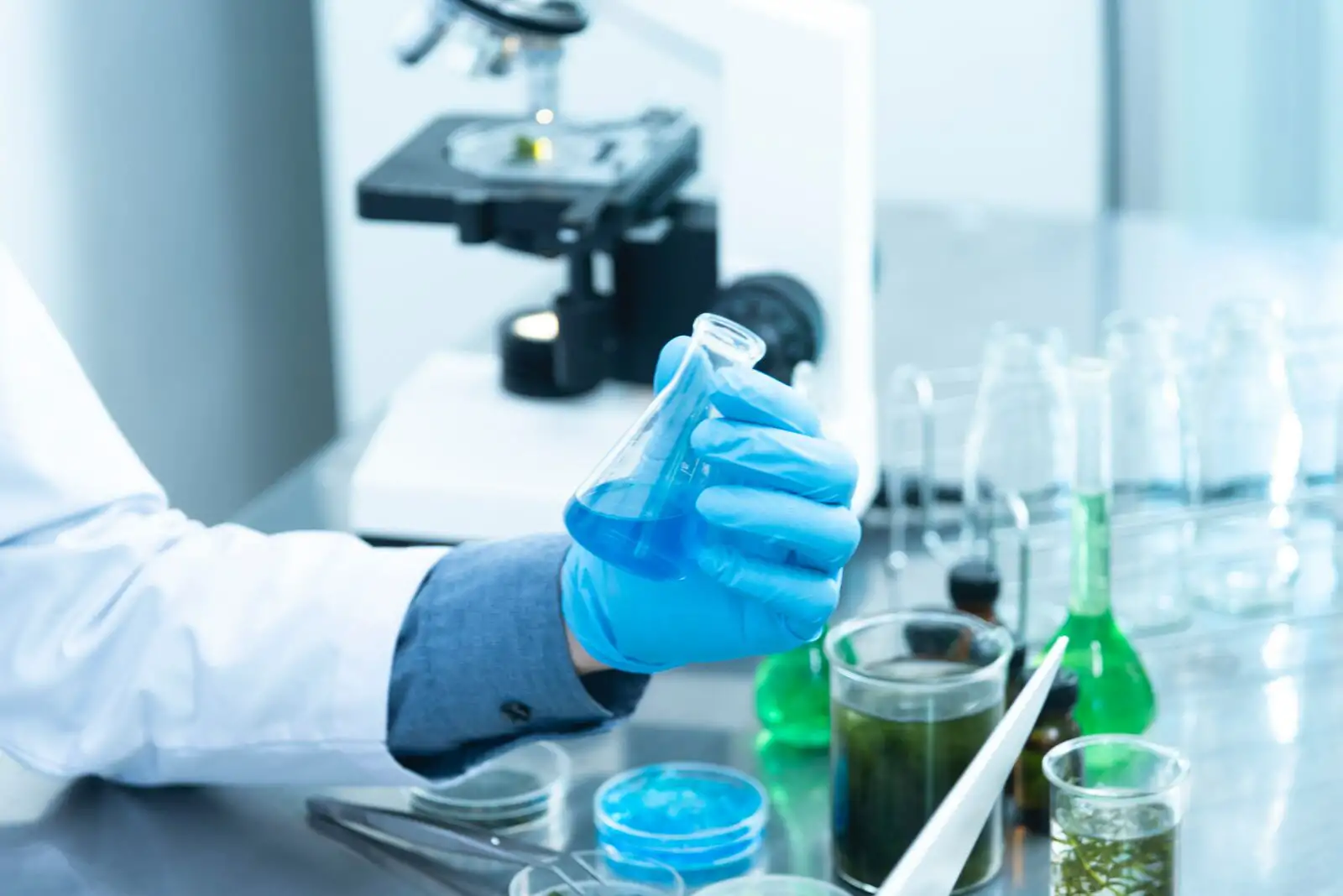 National Building Material Lab is certified chemical testing Laboratory in our region, we provide Chemical Testing in Kovvur. We offer a wide range of goods, including building materials, water, solid fuels, metals and alloys that are well-known in chemical analyses of different types of raw materials. Our laboratory is equipped and facilitated with correct calibrated advance testing equipment and instruments to do testing and errorless analysis to get accuracy in results, and our laboratory is experienced in doing proper sampling and chemical analysis of provided samples.
National Building Material Lab is certified chemical testing Laboratory in our region, we provide Chemical Testing in Kovvur. We offer a wide range of goods, including building materials, water, solid fuels, metals and alloys that are well-known in chemical analyses of different types of raw materials. Our laboratory is equipped and facilitated with correct calibrated advance testing equipment and instruments to do testing and errorless analysis to get accuracy in results, and our laboratory is experienced in doing proper sampling and chemical analysis of provided samples.It is important to conduct testing with proper safety precautions and safety guidelines in order to guarantee the chemical's safety, quality, productivity, and control. Additionally, it is crucial to conduct an accurate chemical analysis for safety measures. Our Laboratory is dedicated to providing the best level of services and testing facilities.
What is Chemical Testing?
Chemical testing is the process of analyzing the performance of a chemical to determine the purpose of its use. In many cases, the test can be conducted at the site of use to determine the health of the population that is being treated. Operating in accordance with ISO 17025, NABL SCOPE and NABL Guidelines Good Laboratory Practice (GLP), Good Manufacturing Practice (GMP), and other acknowledged industry standards, we offer sophisticated Chemical Testing in Kovvur with high quality research and testing capabilities. We carry out testing procedures in accordance with established methodologies (IS, ISO, EN, BS, ASTM, DIN, RDSO, etc.), and we are specialists in creating custom analytical processes and carrying out method validation for particular testing uses. L&T, Ultratech Cement, GKC, Maa Kudargarni Group, Rama TMT, SKS Ispat RDSO, CPWD, and other companies are some of our clients.Benefits of Chemical Testing in Kovvur
There are many benefits to using chemical testing services. Some of the main benefits may include:- 1. A better quality product
- 2. Faster delivery of tests
- 3. More accurate results
- 4. Lower cost of testing
- 5. More accurate and accurate results overall
- 6. Efficient and efficient testing process
- 7. Efficient testing of products and services
- 8. Efficient testing of products and services for safety
- 9. Efficient testing of products and services for compatibility
- 10. Efficient testing of products and services for quality
- 11. Efficient testing of products
Application Area of Chemical Testing
An extensive range of Chemical testing in Kovvur is performed by us to check the various chemical properties of the products such as compound structure and many more. These tests are inspected by skilled scientists who maintain each details and offer accurate results. We perform these tests on cement, Almunium, polymer, rubber, brass, lime, steel, cast iron, iron ore, guipsum, soil, drinking/cunstruction water and many more components. The result produced by these tests is true and right.
![Chemical Testing in Kovvur - National Building Material Lab Chemical Testing in Kovvur - National Building Material Lab]() FLY ASH
FLY ASH
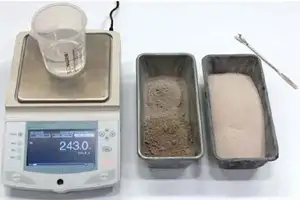 When bituminous coal or sub-bituminous coal is burned, the residue left behind is known as pulverised fuel ash (lignite). About 80% of the entire ash is finely separated, exits the boiler with the flue gases, and is collected using the appropriate technologies. This ash is commonly known as fly ash. It might also be referred to as hopper ash and chimney ash. One of the most typical waste products produced by coal burning is fly ash. It is made of of tiny particles that are primarily made of aluminosilicate glass, mica, and quartz and are gathered by electrostatic separators (filters) from gaseous byproducts of coal combustion.
When bituminous coal or sub-bituminous coal is burned, the residue left behind is known as pulverised fuel ash (lignite). About 80% of the entire ash is finely separated, exits the boiler with the flue gases, and is collected using the appropriate technologies. This ash is commonly known as fly ash. It might also be referred to as hopper ash and chimney ash. One of the most typical waste products produced by coal burning is fly ash. It is made of of tiny particles that are primarily made of aluminosilicate glass, mica, and quartz and are gathered by electrostatic separators (filters) from gaseous byproducts of coal combustion.
As a waste product from several thermal power plants and industrial facilities that use pulverised, crushed, or ground coal or lignite as boiler fuel, pulverised fuel ash is widely available throughout the nation. The efficient use of pulverised fuel ash as pozzolana in the production of cement and as a partial cement replacement, as an additive in cement, cement mortar, and concrete, lime pozzolana mixture, and goods such fly ash lime bricks, concrete blocks, asbestos cement products, etc. Indian pulverised fuel ashes have shown larger scope for their use as a construction material and we are providing chemical testing in Kovvur.
Fly ash's chemical properties are a major limiting factor in its ability to be used as a material in various contexts and industries. To check the quality of fly ash, a correct chemical analysis is required and we provide chemical testing in Kovvur. Fly ash's chemical composition is a key requisite for its usability as a material in various applications and relevant industries.
Some of the Common Tests Conducted on Fly Ash (Calcareous & Siliceous) include (as per IS 1727)
1. Loss on Ignition
2. Magnesium Oxide
3. Silicon Dioxide + Alumina + Iron Oxide % by mass
4. Silicon Dioxide
5. Sulphur Trioxide
6. Calcium Oxide
7. Sulphate content
Major Equipment's Used
1. Oven
2. Hot Plate
3. Muffle Furnace
![Chemical Testing in Kovvur - National Building Material Lab Chemical Testing in Kovvur - National Building Material Lab]() METALS & ALLOYS
METALS & ALLOYS
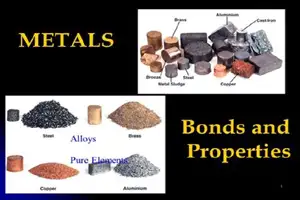 Metals can be chemically analysed for a wide range of applications, including reverse engineering, failure analysis, and manufacturing quality control. For enterprises to guarantee that their materials or products have been made to the correct alloy grade and conform to national or international regulations and standards, material identification, characterization, and verification are vital.
Metals can be chemically analysed for a wide range of applications, including reverse engineering, failure analysis, and manufacturing quality control. For enterprises to guarantee that their materials or products have been made to the correct alloy grade and conform to national or international regulations and standards, material identification, characterization, and verification are vital.In order to identify the alloys used to create a component and to assess whether the right alloy was used, metal chemical testing in Kovvur analysis is frequently utilised in failure investigations and reverse engineering. Our chemists are a highly knowledgeable group of specialists with a focus on metals and alloys. While some of them have advanced degrees, others have expertise spanning more than 17 years. They test according to appropriate norms and regulations and are familiar with the majority of industry standards. The most recent technology is available in our ISO-17025-approved and accredited laboratories. Methods for chemical analysis include:
 Spark-OES (Optical emission spectrometer) - for bulk elemental analysis of steels, stainless steels, Cast irons, copper And Its alloys, aluminum and its alloys, tin, Lead, Bronze and zinc and its alloys.
Spark-OES (Optical emission spectrometer) - for bulk elemental analysis of steels, stainless steels, Cast irons, copper And Its alloys, aluminum and its alloys, tin, Lead, Bronze and zinc and its alloys.
 By Wet Method (as per IS , ASTM,ISO)
By Wet Method (as per IS , ASTM,ISO)
 Some of the Common Elemental Chemical Analysis Tests Conducted on Metals & Alloy include (as per IS,ASTM,ISO and RDSO standards)
Some of the Common Elemental Chemical Analysis Tests Conducted on Metals & Alloy include (as per IS,ASTM,ISO and RDSO standards)
1. Carbon
2. Manganese
3. Nickel
4. Phosphorous
5. Silicon
6. Sulphur
7. Chromium
8.Copper
9. Lead
10.Zinc
Major Equipment's Used
1. Spectrometer
2. Carbon Apparatus.
3. Calibrated Glass Apparatus.
![Chemical Testing in Kovvur - National Building Material Lab Chemical Testing in Kovvur - National Building Material Lab]() MINERALS & ORES
MINERALS & ORES
 Every country's economy is dependent on mineral and ore resources, which serve as a crucial pillar for the expansion of a country's wealth and economy on the global stage. India is very wealthy in this resource and continues to extract minerals and ore from its territory in order to develop the country. Because mining and excavation are required to obtain these resources from the earth during this process, it is necessary to adhere to government-made environmental safety policies.
Every country's economy is dependent on mineral and ore resources, which serve as a crucial pillar for the expansion of a country's wealth and economy on the global stage. India is very wealthy in this resource and continues to extract minerals and ore from its territory in order to develop the country. Because mining and excavation are required to obtain these resources from the earth during this process, it is necessary to adhere to government-made environmental safety policies.
Minerals are inorganic solids that develop in nature and have a crystalline structure as well as a specific spectrum of chemical formulas and provide chemical testing in Kovvur. Ores are areas of mineral concentration in rock that can be economically mined for use. Our industries, such as steel, aluminium, cement, etc., depend heavily on mineral and ore resources for their raw materials. In order to run enterprises more effectively, mineral and ore quality and chemical composition are crucial factors. To meet this need, our laboratory tests the quality and recovery of minerals and ore in order to provide companies with excellent service. As per Standards like IS ASTM ISO etc some of the mineral our laboratory test are as given below/
A) IRON ORES
Iron ore is a mineral substance which, when heated in the presence of a reluctant, will yield metallic iron (Fe). It almost always consists of iron oxides, the primary forms of which are magnetite (Fe3O4) and hematite (Fe2O3).Iron ore is the source of primary iron for the world's iron and steel industries. It is therefore essential for the production of steel, which in turn is essential to maintain a strong industrial base. Almost all (98%) iron ore is used in steelmaking. Iron ore is mined in about 50 countries. The seven largest of these producing countries account for about three-quarters of total world production.
Some of the Common Tests Conducted on Iron Ore include (as per IS)
1. LOI
2. Fe2O3
3. Al2O3
4. Sulphur
5. Phosphorus
6. SiO2
B) BAUXITE
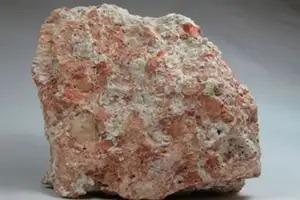 Bauxite is a naturally occurring, heterogeneous substance that is predominantly made up of one or more aluminium hydroxide minerals with minimal or trace amounts of diverse mixes of silica, iron oxide, titania, aluminosilicate, and other impurities. Gibbsite and the polymorphs boehmite and diaspore are the main aluminium hydroxide minerals that are present in bauxites in different amounts.
Bauxite is a naturally occurring, heterogeneous substance that is predominantly made up of one or more aluminium hydroxide minerals with minimal or trace amounts of diverse mixes of silica, iron oxide, titania, aluminosilicate, and other impurities. Gibbsite and the polymorphs boehmite and diaspore are the main aluminium hydroxide minerals that are present in bauxites in different amounts.Bauxites are often divided into categories according on the commercial use they are intended for, such as abrasive, cement, chemical, metallurgical, refractory, etc. About 85% of the world's bauxite supply is utilised as feed to make alumina using the wet chemical caustic leach process, also known as the Bayer process. The majority of the alumina that is created as a result of this refining process is then used as a feedstock for the all-Heroult electrolytic reduction of alumina in a molten bath of natural or artificial cryolite (Na3AlF6), which produces aluminium metal.
Some of the Common Tests Conducted on Bauxite include (as per IS)
1. LOI
2. Fe2O3
3. Al2O3
4. TiO2
5. SiO2
C) MANGANESE ORE
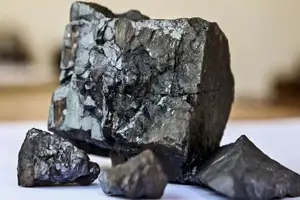 Processing manganese involves getting the ore ready for usage in different products.
Processing manganese involves getting the ore ready for usage in different products.With a melting temperature of 1,244 C, manganese (Mn) is a hard, silvery-white metal (2,271 F). It is typically too brittle to be useful for structural purposes on its own, but it is a crucial ingredient in the production of steel since it cleans the metal of impurities like oxygen and sulphur while also giving it vital physical qualities. It is most frequently used for these applications as a ferromanganese or silicomanganese alloy; as a pure metal, it is combined with several nonferrous alloys.
The most important manganese ores are the oxides pyrolusite, romanechite, manganite, and hausmannite and the carbonate ore rhodochrosite. Rhodonite and bra unite, both silicate ores, are frequently found with the oxides. Only ores containing greater than 35 percent manganese are considered commercially exploitable. Impurities include oxides of other metals, such as iron, that are reduced along with manganese upon smelting; nonmetallic elements such as phosphorus, sulfur, and arsenic; and metallic "gangue oxides" such as silica, alumina, lime, and magnesia, which, with the exception of silica, generally remain in the slag upon smelting.
Some of the Common Tests Conducted on Manganese Ore include (as per IS)
1. SiO2
2. MnO2
3. Al2O3
4. Fe2O3
5. Sulphur
D) LIMESTONE AND DOLOMITE
 Their study has been the topic of a great deal of discussion and disagreement as calcium-bearing minerals have become more widely used in agricultural, energy, and road construction, Steel and alloy production Industries, and more important in the marketplace as a result. In order to convince suppliers to lower their prices and to provide customers assurance that the materials and products they will eventually be utilised in will meet their needs, qualitative analysis is essential.
Their study has been the topic of a great deal of discussion and disagreement as calcium-bearing minerals have become more widely used in agricultural, energy, and road construction, Steel and alloy production Industries, and more important in the marketplace as a result. In order to convince suppliers to lower their prices and to provide customers assurance that the materials and products they will eventually be utilised in will meet their needs, qualitative analysis is essential.
Some of the Common Tests Conducted on Limestone include (as per IS)
1. LOI
2. Fe2O3
3. Al2O3
4. CaO
5. SiO2
6. MgO
7.Carbonate content
8. Sulphur
9. Chloride
![Chemical Testing in Kovvur - National Building Material Lab Chemical Testing in Kovvur - National Building Material Lab]() Why You Can Choose Our Chemical Testing in Kovvur?
Why You Can Choose Our Chemical Testing in Kovvur?
There are a number of reasons why it is important to choose a reputable and qualified laboratory for chemical testing services:
Accreditation: The laboratory should be accredited by a recognized body, such as the American Association for Laboratory Accreditation (A2LA) or the International Organization for Standardization (ISO), to ensure that it adheres to the highest standards of quality and accuracy.
Experience: It is important to choose a laboratory that has experience in the specific type of testing you require, as different tests have different requirements and may need specialized equipment or expertise.
Equipment: The laboratory should have the necessary equipment and instrumentation to perform the tests accurately and efficiently. And we provide chemical testing in Kovvur with all the facilities.
Data security: The laboratory should have appropriate security measures in place to ensure that the data and samples are handled and stored safely and confidentially.
Turnaround Time: Chemical Testing in Kovvur provide the test results in a reasonable time frame that suits your need or the criticality of the result.
Cost-Effective: Our lab provide the services at a reasonable cost compared to other labs in the market.
Good customer Service: Our laboratory have a good customer service, which is responsive and helpful when it comes to answering questions, providing quotes and explaining the results of the test.
Overall, it is important to take the time to carefully evaluate different laboratories and select one that has the necessary qualifications, experience, and equipment to provide accurate and reliable results. And National Building Material Testing Lab provide Best Services to their customers.
Accreditation: The laboratory should be accredited by a recognized body, such as the American Association for Laboratory Accreditation (A2LA) or the International Organization for Standardization (ISO), to ensure that it adheres to the highest standards of quality and accuracy.
Experience: It is important to choose a laboratory that has experience in the specific type of testing you require, as different tests have different requirements and may need specialized equipment or expertise.
Equipment: The laboratory should have the necessary equipment and instrumentation to perform the tests accurately and efficiently. And we provide chemical testing in Kovvur with all the facilities.
Data security: The laboratory should have appropriate security measures in place to ensure that the data and samples are handled and stored safely and confidentially.
Turnaround Time: Chemical Testing in Kovvur provide the test results in a reasonable time frame that suits your need or the criticality of the result.
Cost-Effective: Our lab provide the services at a reasonable cost compared to other labs in the market.
Good customer Service: Our laboratory have a good customer service, which is responsive and helpful when it comes to answering questions, providing quotes and explaining the results of the test.
Overall, it is important to take the time to carefully evaluate different laboratories and select one that has the necessary qualifications, experience, and equipment to provide accurate and reliable results. And National Building Material Testing Lab provide Best Services to their customers.

 FLY ASH
FLY ASH

